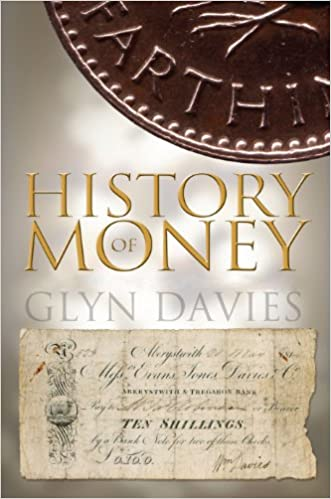1/6
Just before I saw this article I was re-reading (for the second time) Glyn Davies's 1994 history of money and came across this passage:
"There are few things more impressive than the haughty analytical certainty with which fundamental theories... https://www.ft.com/content/a7229df1-5260-4104-a89c-fb4a77271310
Just before I saw this article I was re-reading (for the second time) Glyn Davies's 1994 history of money and came across this passage:
"There are few things more impressive than the haughty analytical certainty with which fundamental theories... https://www.ft.com/content/a7229df1-5260-4104-a89c-fb4a77271310
2/6
of money are for a time universally held, only to be discarded in favour of a diametrically opposite but equally firmly and widely held new orthodoxy, which in turn lasts until the whole process reverses itself suddenly a generation or so later. It is this process of...
of money are for a time universally held, only to be discarded in favour of a diametrically opposite but equally firmly and widely held new orthodoxy, which in turn lasts until the whole process reverses itself suddenly a generation or so later. It is this process of...
3/6
polarized change which is the long-term constant in the history of money, the points of change naturally occurring during short periods of such obvious crisis in monetary affairs that thoroughgoing investigations by the monetary authorities take place accompanied by an...
polarized change which is the long-term constant in the history of money, the points of change naturally occurring during short periods of such obvious crisis in monetary affairs that thoroughgoing investigations by the monetary authorities take place accompanied by an...
4/6
intensification of theoretical discussion by economists and other such financial journalists, and even by the usually reticent body of bankers. Born of the crisis, new monetary practices come quickly into being, accompanied at a rather more leisurely pace by the...
intensification of theoretical discussion by economists and other such financial journalists, and even by the usually reticent body of bankers. Born of the crisis, new monetary practices come quickly into being, accompanied at a rather more leisurely pace by the...
5/6
appropriate theories which rule until the next crisis or series of crises cause a reverse swing in the whole process"
Earlier in the book Davies points out that rather than a single dominant theory of money there is a range of theories, any one of which can dominate...
appropriate theories which rule until the next crisis or series of crises cause a reverse swing in the whole process"
Earlier in the book Davies points out that rather than a single dominant theory of money there is a range of theories, any one of which can dominate...
6/6
at any given time, but which "oscillate" from one extreme to another, depending on the conflicting interests and relative power of debtors and creditors.
at any given time, but which "oscillate" from one extreme to another, depending on the conflicting interests and relative power of debtors and creditors.

 Read on Twitter
Read on Twitter


